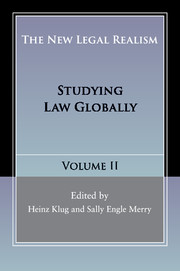Book contents
- Frontmatter
- Dedication
- Contents
- List of contributors
- Preface to The New Legal Realism, Volumes I and II
- 1 Introduction
- Section I The Globalization of Law
- Section II The Global Transfer of Norms
- Section III global institutions and the changing roles of judges and lawyers
- 8 New Legal Realism and International Law
- 9 The Deconstruction of Offshore
- 10 The Changing Roles of Lawyers in China: State Bureaucrats, Market Brokers, and Political Activists
- Section IV Global Justice
- Index
- References
10 - The Changing Roles of Lawyers in China: State Bureaucrats, Market Brokers, and Political Activists
from Section III - global institutions and the changing roles of judges and lawyers
Published online by Cambridge University Press: 05 May 2016
- Frontmatter
- Dedication
- Contents
- List of contributors
- Preface to The New Legal Realism, Volumes I and II
- 1 Introduction
- Section I The Globalization of Law
- Section II The Global Transfer of Norms
- Section III global institutions and the changing roles of judges and lawyers
- 8 New Legal Realism and International Law
- 9 The Deconstruction of Offshore
- 10 The Changing Roles of Lawyers in China: State Bureaucrats, Market Brokers, and Political Activists
- Section IV Global Justice
- Index
- References
Summary
The contemporary Chinese legal profession has been built on the ruins of the Cultural Revolution (1966–1976). When the economic reform began in the late 1970s, the traditional social structure of the country had been bulldozed, and most state and market institutions had to be rebuilt from scratch. Reflections on the social and political turmoil during the Cultural Revolution made the Chinese leadership reconsider the importance of law and legal institutions in maintaining social order and promoting economic development. This generated the most comprehensive state-led legal reform in Chinese history, which has lasted until the present day.
The three decades of rapid reform have changed the landscape of the Chinese legal system in fundamental ways. In legislation, more than 10,000 laws, regulations, ministerial regulations, judicial interpretations, and local regulations have been promulgated and many revised more than once in less than thirty years (Cai 1999; Zhu 2007; Liu and Halliday 2009). In the judicial system, army veterans have been gradually replaced by law graduates, while Chinese courts and procuracies have become complex organizations with an internal bureaucratic structure (Woo 1991, 1999; Zhang 2003; Liu 2006a; Liebman 2007; He 2012). In legal education, more than 600 law schools have been reestablished or newly inaugurated (Zhu 2007: 520), and the knowledge basis of Chinese legal research and education has become Westernized and increasingly technical (Liu 2011b). In appearance, we seem to have witnessed a classic Weberian rationalization of law in the Middle Kingdom (Weber 1978).
Yet the legal system never operates in a vacuum – it always evolves through interactions with its market and political environments. As Chinese law develops into a complex and self-sustaining formal system (Luhmann 2004), its distance from ordinary social life is also substantially increased. The massive appropriation of foreign legal codes and institutions has resulted in the decoupling of formal law from law in action in almost every aspect of the Chinese legal system. Most important, the construction of the legal system is accompanied by rapid structural changes in both the Chinese state and the market economy it seeks to develop. This peculiar juxtaposition of law, state, and market has produced a highly fragmented market for Chinese lawyers in the reform period.
- Type
- Chapter
- Information
- The New Legal RealismStudying Law Globally, pp. 180 - 198Publisher: Cambridge University PressPrint publication year: 2016
References
- 3
- Cited by



